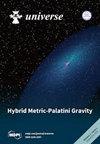用重子塔利-费舍尔关系探测螺旋星系的非线性密度波理论
IF 2.5
4区 物理与天体物理
Q2 ASTRONOMY & ASTROPHYSICS
引用次数: 0
摘要
重子质量-速度关系是对不同星系动力学模型(如兰姆达-冷暗物质(ΛCDM)和修正牛顿动力学(MOND)等替代模型)的重要检验。带有孤子解的新颖非线性密度波理论提供了一个机会,检验推导出的旋转速度表达式是否能够支持盘状星系质量与旋转速度之间众所周知的塔利-费舍经验关系。最初的假设不涉及任何支持极薄星系盘稳定性的较大暗物质晕,也不涉及任何作用于星系尺度的修正引力加速度。相反,在星系盘的外部,星系盘质量成分之间通过引力势发生了重要的引力相互作用。数据是通过对 81 条晚螺旋型旋转曲线样本的拟合程序获得的,拟合程序使用的是银河系表面质量密度非线性薛定谔方程(NLS)的自洽性精确解中得出的旋转速度表达式。这些选定天体在重子质量-旋转速度平面上的位置遵循 logMb=3.7±0.2logVflat+2.7±0.4 的关系,与文献中的发现基本一致。本文章由计算机程序翻译,如有差异,请以英文原文为准。
Probing the Nonlinear Density Wave Theory of Spiral Galaxies by Baryonic Tully–Fisher Relation
The baryonic mass–velocity relation provides an important test of different galaxy dynamics models such as Lambda–cold dark matter (ΛCDM) and alternatives like Modified Newtonian Dynamics (MOND). Novel nonlinear density wave theory with a soliton solution gives an opportunity to test whether the derived rotational velocity expression is able to support the well known Tully–Fisher empirical relation between mass and rotation velocity in disk galaxies. Initial assumptions do not involve any larger dark matter halo that supports the stability of the very thin galactic disk nor any modified gravitational acceleration acting on galactic scales. It rather follows an important gravitational interaction between constituents of disk mass in the outer part of the disk via gravitational potential. Data are obtained by a fitting procedure applied on the sample of 81 rotational curves of late type spirals using expressions for the rotational velocity derived as an exact, a self-consistent solution of the nonlinear Schrodinger (NLS) equation for galactic surface mass density. The location of these selected objects in the baryonic mass–rotation velocity plane follows the relation logMb=3.7±0.2logVflat+2.7±0.4 in marginal agreement with the findings in the literature.
求助全文
通过发布文献求助,成功后即可免费获取论文全文。
去求助
来源期刊

Universe
Physics and Astronomy-General Physics and Astronomy
CiteScore
4.30
自引率
17.20%
发文量
562
审稿时长
24.38 days
期刊介绍:
Universe (ISSN 2218-1997) is an international peer-reviewed open access journal focused on fundamental principles in physics. It publishes reviews, research papers, communications, conference reports and short notes. Our aim is to encourage scientists to publish their research results in as much detail as possible. There is no restriction on the length of the papers.
 求助内容:
求助内容: 应助结果提醒方式:
应助结果提醒方式:


